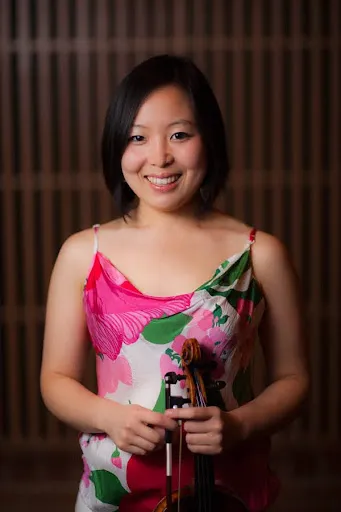Catherine Kei Fukuda '07

Catherine Kei Fukuda ‘07
Violinist Catherine Kei Fukuda '07 came to Swarthmore interested in pursuing a career in medicine. Finding deep connections through chamber music and Swarthmore’s music department compelled her to change her plan and pursue a career in music. She double majored in music and biology at Swarthmore, followed by a Master’s degree in violin performance at Kent State University. Since graduating she’s built an extraordinary musical resume that includes community engagement programs and playing in orchestras and chamber groups. Through her connections and work, Kei explains that she’s never fully left Swarthmore, “I’ve had the joy and privilege of teaching violin and chamber music [through the Fetter Chamber Music Program] at Swarthmore over the last 7 years.”
Kei’s familial connections to Quaker values made Swarthmore the perfect fit. Her great-grandfather studied Quakerism at Swarthmore and Earlham College, going on to start a Quaker meeting in Japan. Her grandmother was also a lifelong Quaker who graduated from Friends School in Tokyo. Kei’s favorite Swarthmore memories include midnight walks in the Crum Woods, late night chamber music reading parties, and “lots of nerdy music hangs.”
“On an intuitive level, the student vibe felt right to me, and I fell in love with the campus and Crum woods. I also loved the proximity to the city and being able to access high quality arts easily with the train station being right on campus. On a deeper level, the Quaker values and commitment to social justice and community were important to me.”
Kei arrived at Swarthmore planning on a career in medicine, because she thought it would be the most effective way to help her community. Professor Whitman’s passion for music theory and history, and former Professor John Alston’s work with the Chester Children’s Chorus changed her perspective. “It never occurred to me that you can take anything that you are passionate about and use that as a vehicle to serve others.”
“Having that spiritual fulfillment of music in your life has a huge impact on quality of life, but for a child whose day-to-day environment is challenging to say the least, it can be the only thing that keeps them moving forward,” said Kei.
Kei’s Swarthmore education and close work with Swarthmore music professors opened her eyes to the unequal power structures that exist within education and the world at large, and she found a way to use music to combat that.
“I decided right before my senior year that I wanted to study the violin seriously and started practicing 4 hours a day so that I could prepare for grad school auditions.” She attended graduate school in Kansas City, where she started an after-school violin program in which she taught group violin lessons at a French speaking charter school. She also made efforts to start an El Sistema inspired music program that “involved using chamber music and food as a way to build community for students in underserved neighborhoods.” El Sistema is a music education program, pioneered in Venezuela, with the motto “Music for Social Change.” Unfortunately the program never got off the ground, but two years spent visiting Sistema programs around the country, doing research, and building relationships helped prepare Kei for her future work with organizations like ARTolerance and the Suzuki Alumni Project.
Since moving to Philadelphia, she has pursued a multifaceted career spanning music education, performance, and arts administration. She is a member of the Chamber Orchestra of Philadelphia, Delaware Symphony, and the Britt Festival Orchestra and regularly plays with the Philadelphia Ballet and Opera Philadelphia. She has worked extensively with Project 440 which helps prepare young musicians for their futures. Most recently, she has been working at the Curtis Institute of Music as the Musician Life Cycle Manager, a position in which she analyzes Curtis’s admissions process for continuous improvement.
Kei’s goal in her career is to bring Swarthmore’s values into the field of music. "As someone who loves this art form but can see all of the problematic aspects of performing arts institutions in this country, I’d like to think that I can help push this field into a positive direction that is accessible to and inclusive of more people."



